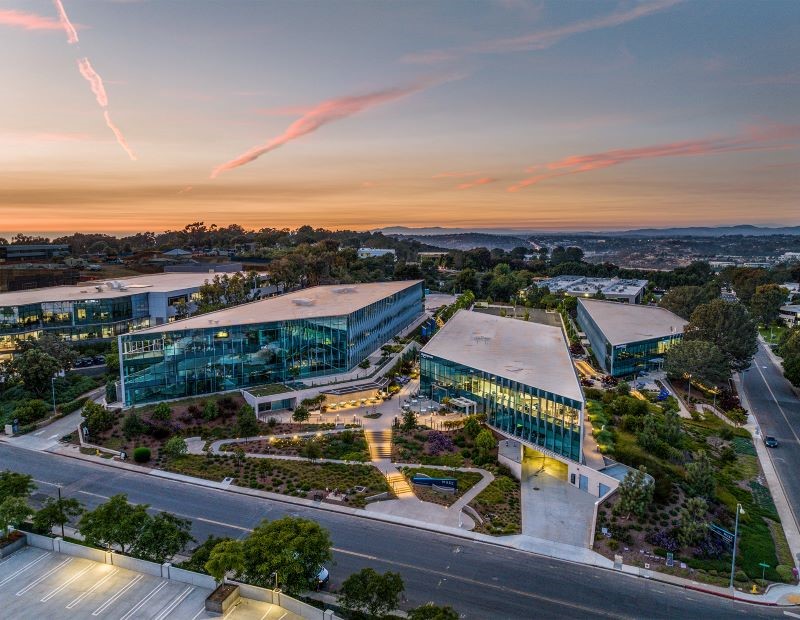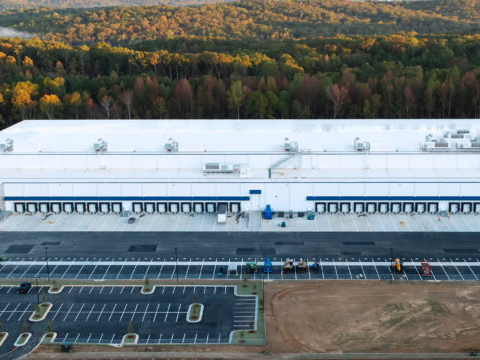The Long Road to Accommodating EVs
As the electric vehicle industry is growing, CRE owners and developers are grappling with what to build and where.

EV panel at NAREE’s 57th Annual Real Estate Journalism Conference in Las Vegas. Image by Lew Sichelman
One day, perhaps in a galaxy far, far away, electric vehicle charging stations will be on every other street corner, just like gasoline stations are now. Perhaps they’ll even replace them. For now, though, commercial real estate owners and developers are grappling with what to build and where.
That’s according to Andrew Bailey of EnviroSpark Energy Solutions, who told a group of real estate reporters at the National Association of Real Estate Editors annual conference in Las Vegas yesterday that the sector is trying to come to grips with how many electric vehicle drivers there are and what they want. The EV panel was moderated by Commercial Property Executive Editorial Director Suzann Silverman.
There’s a “huge need,” said Bailey, whose Atlanta-based firm is a national turnkey EV solutions provider that is working to help builders and owners figure it all out.
Bailey advised members of the National Association of Real Estate Editors to tell their readers to get on board. “Retail, commercial, multifamily; everyone’s got to get with the program,” he said.
READ ALSO: Electric Vehicles Put a Charge in Industrial Growth
Even though EnviroSpark has 7,000 or so installations under its belt, it hasn’t even scratched the surface, the company’s chief strategy officer said. “Our business is starting to take off.”
While Bailey called for a “start slow” approach, another speaker, Jim Hurless, the managing director of CBRE’s global electric vehicle business, advised a “collaborative, intelligent approach.” Working together, he added, will “help ensure” that commercial real estate owners find the right people to their EV businesses.
Of utmost importance, though, is to “collaborate with your utility provider,” Hurless said. “That’s a key partner that can show you the least expensive way to proceed or the best way.”
It’s also smart to work with the local authorities. “Working with the city, you can leverage solar panels and battery storage to deliver even more savings,” Hurless said.
The CBRE executive said he advises his commercial real estate clients to treat the process of building charging stations “as a pipeline; start now and add more three, four or five years down the line.”
For the most part, CBRE’s clients accept that they need EV charging stations but are not particularly keen on operating them themselves. “They all want someone to do it for them,” Hurless told the assembled journalists. “They can collect rent and it frees them from all the hassles.”
Hurless estimated that less than 5 percent of all office buildings offer charging stations for their tenants and their visitors. But a third panelist, David Aaronson of Refuel Electric Vehicle Solutions, a firm which deals solely with multifamily operators, said it “wouldn’t surprise me” if it was less than 1 percent.
Many existing office structures just don’t have enough electricity to satisfy all their needs, so they are going to have to settle with station sharing, an approach that must be taken care of by a parking valet, Hurless said. When one vehicle is fully charged, the attendant will move it and replace it with another.
“Eventually,” he said, “we’re going to figure out the logistics of all this. But cars are not being charged at home, so it might take a large public network of EV stations to make it all work.”








You must be logged in to post a comment.